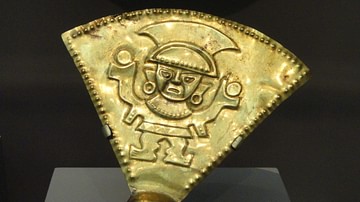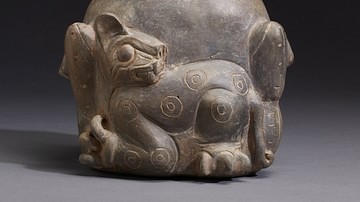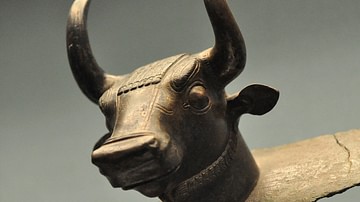Search
Search Results

Definition
Chimu Civilization
The Chimu civilization, otherwise called the kingdom of Chimor, flourished on the northern coast of Peru between the 12th and 15th centuries CE. With their capital at Chan Chan, the Chimu were the largest and most prosperous culture in the...

Article
Early Explorers of the Maya Civilization: John Lloyd Stephens and Frederick Catherwood
The names of John Lloyd Stephens and Frederick Catherwood are forever linked to the Maya and Mayan studies as the two great explorers who documented the ruins from Copan in the south to Chichen Itza in the north. The stories told by Stephens...

Definition
Chavin Civilization
The Chavin civilization flourished between 900 and 200 BCE in the northern and central Andes and was one of the earliest pre-Inca cultures. The Chavin religious centre Chavin de Huantar became an important Andean pilgrimage site, and Chavin...

Definition
Urartu Civilization
Urartu, also known as the Kingdom of Urartu or the Kingdom of Van, was a civilization which developed in the Bronze and Iron Age of ancient Armenia, eastern Turkey, and northwestern Iran from the 9th century BCE. Controlling territories through...

Definition
Wanka Civilization
The Wanka (also Wanca or Huanca) people occupied the highlands of ancient central Peru around Lake Junin and the Manataro, Chanchamayo and Tarma rivers. The culture flourished from the Middle to Late Horizon periods (600 CE - 1532 CE). Dwelling...

Article
Sumerian Civilization: Inventing the Future
Imagine something that has never been thought of before. If one holds a book in one's hands, one can imagine an e-book, a large-print book, a picture book, all kinds of books. But how does one imagine a book in a world where even the concept...

Image Gallery
A Gallery of the Indus Valley Civilization
The Indus Valley Civilization (c. 7000-c. 600 BCE) is among the oldest in the world but, as it was only “discovered” in 1829 – after ancient Egyptian and Mesopotamian sites had already been excavated – many of the “firsts” of civilization...

Definition
Roman Art
The Romans controlled such a vast empire for so long a period that a summary of the art produced in that time can only be a brief and selective one. Perhaps, though, the greatest points of distinction for Roman art are its very diversity...

Article
A Roman Trail in the Moselle Valley
The Moselle Valley is Germany's oldest winegrowing region. The Romans brought viticulture to this area and planted vines along the Moselle River 2000 years ago. After settling the region c. 50 BCE and establishing the city of Trier (Augusta...

Definition
Roman Empire
The Roman Empire, at its height (c. 117), was the most extensive political and social structure in western civilization. Building upon the foundation laid by the Roman Republic, the empire became the largest and most powerful political and...